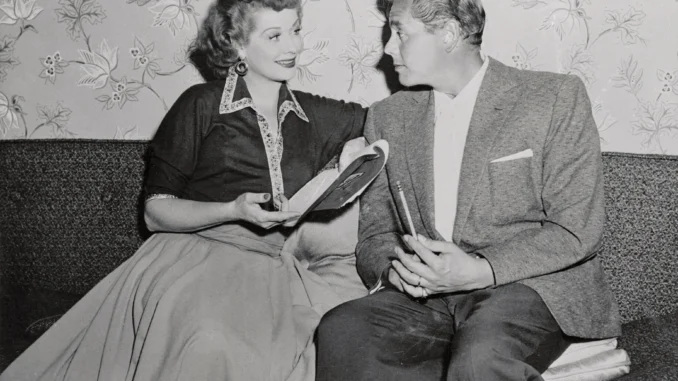
At the height of “I Love Lucy,” TV’s insanely popular ‘50s sitcom starring real-life spouses Lucille Ball and Desi Arnaz, the Red Scare nearly brought down Hollywood’s most famous redhead. Or did it?
Two years into the sitcom’s run, at the height of Ball‘s reign as America’s sweetheart, the actress was questioned by the House Un-American Activities Committee in its attempt to hunt out Americans suspected to have ties to the Communist Party during the Cold War era.The revelation of Ball’s link to the party threatened to bring down the beloved funnywoman, as it had the careers of other luminaries — and it now fuels much of the narrative of Aaron Sorkin’s “Being the Ricardos.” Now available to stream on Amazon Prime, the film takes place during a dramatized week of production on “I Love Lucy” in 1952 as Ball’s suspected ties to communism were under investigation by HUAC. It sets off Sorkin’s narrative, which condenses the timeline with other critical moments the couple faced — Ball’s pregnancy with son Desi Arnaz Jr. and mounting speculation about Arnaz’s infidelity — to capture a complex portrait of a beloved marriage under duress.
If you’ve watched the film, and you’ve read this far, you’re likely wondering how accurately it captures these events beyond the liberties taken to condense the timeline. So make like Fred Mertz, pull the glasses off the top of your head and dive in.
“I am not a Communist now. I never have been. I never wanted to be,” Ball said in her testimony, according to the book “Desilu: The Story of Lucille Ball and Desi Arnaz.” “Nothing in the world could ever change my mind. At no time in my life have I ever been in sympathy with anything that even faintly resembled it. … It sounds a little weak and corny now, but at the time, it was very important because we knew we weren’t going to have Daddy [her grandfather] with us very long. … In those days, it was not a terrible thing to do. It was almost as terrible to be a Republican in those days.” (Sorkin makes use of the final sentiment in Ball’s conversation with CBS executives.)
The committee cleared the actress of any wrongdoing, with the assurance that none of the secret testimony would be made public. But two days later, news of her supposed political affiliations began to spread, as the film relays in its opening moments. Walter Winchell, a prominent radio commentator and syndicated newspaper gossip columnist, suggested in a blind item mentioned during his program that “the most popular of all television stars” was questioned about her membership in the Communist Party.
Ball later described her mental state in that difficult period in her autobiography, “Love, Lucy.” “The smash success of our TV show and the physical strain of combining my last pregnancy with a full work schedule took its toll,” she wrote. “I developed a feeling I couldn’t shake. All our good fortune was suddenly going to vanish. … I received a call that seemed to realize my anxious apprehension. The call was from A. Wheeler, an investigator for the House Un-American Activities Committee.”
The film illustrates the lengths Arnaz was willing to go to in order to protect his wife: As depicted in the film, he gathered Desilu officials, along with executives from MGM, CBS and Philip Morris, the show’s sponsor. When they learned Ball had been cleared, Ball recounted, they figured nothing more needed to be done. But in Hollywood, nothing stays secret for long. The news broke.
In a climactic moment in the film, as the show reaches tape night, Arnaz invites members of the press to sit in the audience and gets then-FBI Director J. Edgar Hoover on the phone, putting a mic to the phone receiver, so the audience can hear directly from his mouth that Ball has been cleared. “She’s 100% cleared,” Hoover says to a stunned audience.
